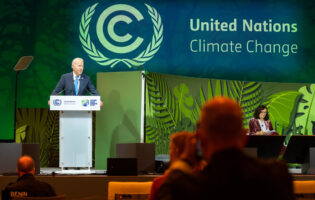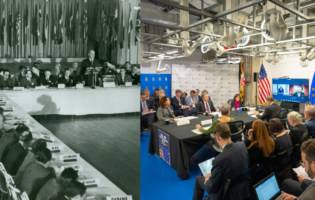What’s at Stake in the Election

Alexander Privitera
AGI Non-Resident Senior Fellow
Alexander Privitera a Geoeconomics Non-Resident Senior Fellow at AGI. He is a columnist at BRINK news and professor at Marconi University. He was previously Senior Policy Advisor at the European Banking Federation and was the head of European affairs at Commerzbank AG. He focuses primarily on Germany’s European policies and their impact on relations between the United States and Europe. Previously, Mr. Privitera was the Washington-based correspondent for the leading German news channel, N24. As a journalist, over the past two decades he has been posted to Berlin, Bonn, Brussels, and Rome. Mr. Privitera was born in Rome, Italy, and holds a degree in Political Science (International Relations and Economics) from La Sapienza University in Rome.
The last days of the U.S. presidential campaign have not only offered a very tight race, they have also spread the illusion that electing a new or confirming the old president will have a deep and lasting impact on the future of the country. There are a number of reasons why that is probably not the case. Some have to do with immediate dangers that the country is facing and some are the result of underlying trends that are already altering the country’s political system.
Let’s start with the biggest danger the nation is facing, namely falling off a ‘fiscal cliff’ and plunging back into recession. Seen in this light, the relevance of the President shrinks considerably, marginalized by the fact that whoever conquers the White House will be at the mercy of a severely dysfunctional Congress. It is Congress which needs to find a path away from the much talked about fiscal cliff. Since decisions need to be made by the end of the year, it is the current President who will have to broker an agreement, even if he, Barack Obama, loses the election on November 6th.
Congress has three options. I’ll brand them as the bold, ‘American‘ choice, which would entail a comprehensive agreement and put the country on a sustainable fiscal path (and, by the way, make a mockery of all the vague promises made by the two Presidential candidates during the campaign); the ’European‘ agreement, which would enable the country to avoid the cliff but only for a few months; and a third possibility, which is no agreement at all. The last one could be branded as the ‘Italian’ option, just to give readers a provocative idea of what dysfunctional democratic political systems are capable of when its representatives suffer from severe myopia and are overwhelmed by self-serving temptations.
The American choice would be the proof that politicians are still capable of putting long-term national interests ahead of partisan politics. It would signal that the center still holds and bipartisanship, albeit limited, can still trump the politics of radicalization. It is bad enough that the country has to resort to a lame duck Congress, and possibly a lame duck President, to strike a necessary deal. But a deal is a deal, even if it’s struck by a bunch of lame ducks.
The European choice is the classic method that allows the proverbial can to be kicked down the road, probably for no more than six months. Europe has tried this method when dealing with its own euro crisis. We know where it ends. The crisis is now three years old and the common currency had a few near death experiences. Gaining time at this juncture carries considerable risks, as it does not allow the thick fog of uncertainty to be lifted anytime soon. Uncertainty poisons economic growth. Companies, awash in cash, would continue to sit and wait for the outcome of the political struggle before making any big commitments. The recovery would remain as anemic as it has been in the last few years. Voters’ disenchantment with their political system would continue to grow.
There is, of course, the third option of doing nothing. Well, good luck with that.
Unfortunately, despite the fact that most politicians know that falling off the cliff carries considerable pain, the current political class could very well prove that it is not up to the task of striking a deal. In all likelihood, it will do just enough to keep the ball rolling.
That would not be surprising as, despite all the recent disparaging remarks about Europe and the comparative advantages of the USA, the political system in Washington is already rapidly morphing into a parliamentary democracy, European style. Because of the entrenched division in Congress, the President has already become a prime minister. With no solid majority in parliament, governing has become impossible. A system with strong checks and balances only works if the political culture allows for compromises. Once that culture, that ethos goes out of the window, the system becomes extremely vulnerable to paralysis. U.S. commentators often describe Europe as an example for a loose union incapable of forging compromises among its very different 27 members. They don’t need to look so far. Many European commentators are starting to see the U.S. democracy increasingly hijacked by big money, incapable of acting on behalf of all Americans. Both sides have a point, but they should not be comforted by what they see.
Prolonged paralysis in the U.S. and Europe is something both sides can ill afford. The outcome of the presidential election matters, of course. But far more important is what Congress and the President will be able to do in the next two months, regardless of the results on Tuesday night. How they behave will not only determine whether the fragile recovery will be replaced by another recession, their actions or lack thereof will also tell the world whether the country is still capable of pragmatically tackling its challenges. Europeans have no reason for complacency, and Americans should not smirk about Europe’s ills. What’s at stake on both sides of the pond is the ability to transcend short-termism and make our respective democracies work for the citizens in the long run. The politics of constant divisiveness need to be replaced by the politics of decisiveness.








